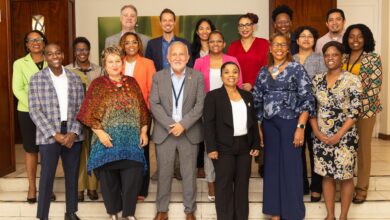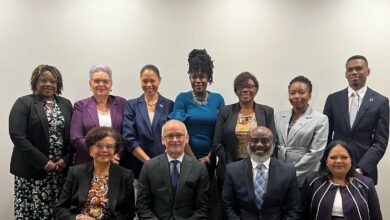❖ Honourable Ministers with responsibility for Culture
❖ Dr. Norbert Richard Ibrahim, Assistant Secretary-General, Organization of African, Caribbean and Pacific States
❖ Mr. Frderik Ekfeldt, Deputy Head of Mission, Delegation of the European Union to Jamaica, Belize, The Bahamas, Turks and Caicos and Cayman Islands
❖ Dr. Saadia Sanchez-Vegas, Director and Representative, UNESCO Cluster Office for the Caribbean;
❖ Ms. Debbie Emamdie, Project Officer in the Office of Research, UWI, Mona
❖ Representatives of the European Union, the OACP, UNESCO, The UWI, CARICOM Secretariat and other partners
❖ Directors of Culture of CARICOM Member States
❖ Artists, cultural professionals, and creative entrepreneurs
❖ Representatives of the Media
- Ladies and Gentlemen
It is a pleasure and privilege for me to represent the Secretary General of the Caribbean Community, Her Excellency Dr. Carla Barnett, who has sent warm greetings and best wishes for a successful launch of the project “Creative Caribbean: An Eco-System of “Play” for Growth and Development” as well as for the impactful implementation of the programme. Dr. Barnett is currently attending to other critical matters overseas and has asked me to stand in and deliver these remarks on her behalf.
I begin my address to you this morning by commending UNESCO, The UWI and CARICOM for the strong partnership which has led to the development of this vital initiative, and to express on behalf of the region, my gratitude to the European Union and the Organisation of African, Caribbean and Pacific States, for the financial and technical support that has made this 11th EDF allocation of Euros 3M to the Caribbean under the “Towards a Viable Cultural Industry: Supporting the Cultural and Creative Sectors in ACP Countries” Programme, a reality.
Master of Ceremonies, I am grateful for this opportunity to reflect with you, on the importance and value of the culture and creative sector to our region, and on the ways in which it is expected that this project will make a difference to the creative economy and creative eco-system of the region.
As the architects of the project conceptualized and articulated, Creative Caribbean brings together important elements of the cultural ecosystem to build on the deeply rooted Caribbean creative ecosystem of ‘play’. This cultural pattern of ‘play’ has produced carnivals and festivals, which have been reproduced in over 70 diasporic spaces worldwide. ‘Play’ is the thread that connects the dynamic musical inventiveness of Reggae and Dancehall, Calypso and Soca, Punta, Bouyon, Compa, Salsa and Denery Segment, and the list goes on.
Play is also inscribed in the steel pan – the only acoustic musical instrument to be invented in the twentieth century. ‘Play’ is pervasive in the literary work of the many internationally celebrated writers of the region – including two Nobel Laureates for Literature – and through our publishers, who have enriched the global literary canon. “Play” ladies and gentlemen, is in the richness of our performing arts in dance, theatre and storytelling, to name a few. Through this pervasive ecosystem of ‘play’, the Caribbean continues to be culturally expressive, prolific and defiant, while seeking to overcome its vulnerabilities and challenges.
The eco-system that this project seeks to develop, like the system in natural sciences from which the term has been derived, is a dynamic, interconnected network of the key components of a strong creative economy: namely innovative industry actors, audiences or consumers, supported by an enabling environment of policy, legislation, incentives, business support services, financing, and intellectual property management.
A strong eco-system will enable a more resilient creative sector that is better able to withstand shocks such as that which has been experienced during the COVID-19 pandemic and will enable the creative sector to have a sustained positive impact on the lives of artists and entrepreneurs, as well as on economic growth and social resilience in the region.
Capacity building of festivals as catalysts for creative industry development is a strong feature of this project and in many ways a well managed festival can be seen as a microcosm of how a thriving creative eco-system can function. Festivals, mounted in our context in a wide variety of creative disciplines, generate streams of direct income from sponsorship, ticket and merchandise sales, but also several secondary revenue streams through expenditure on airlines tickets, hotel accommodation, car rentals, as well as hair, make up and fashion services for the patrons; catering, media and promotion, technical support for sound, stage, lights and festival management; street vendors and the list goes on.
National festivals and the region’s premier, mega Caribbean Festival of Arts (CARIFESTA) stand to benefit from capacity building activities to be implemented through this project. The marketplace component of CARIFESTA which facilitates business interactions between Caribbean artists and international buyers and investors, festival and venue managers, is an area to be targeted for expansion when CARIFESTA returns to our regional calendar of events – hopefully very soon.
Governments of the Caribbean Community have increasingly been acknowledging the value and contribution of the cultural and creative industries to the growth and development of economies in the region. Creative industries represent leverage points for building globally competitive exports and driving the development of national innovation systems and employment. The Twenty-Sixth Inter-Sessional Meeting of Heads of Government held in The Bahamas in February 2015, acknowledged the vital role of the cultural and creative industries and declared its intention to take steps to strengthen the enabling environment to support the sector’s further development. This led to the launch of the Creative and Cultural Industries Innovation Fund by the Caribbean Development Bank in December 2018, established with start-up capital of US$2.6 million.
Towards the development of a comprehensive policy framework to guide the continued development of this sector, priority actions in the Draft Regional Development Strategy for the Cultural Industries were adopted by Ministers of Culture at COHSOD XXII on Culture and Youth, in Guyana in February 2012, presented to them by the Regional Task Force on Cultural Industries, comprising public officials and industry experts. Ministers of Trade identified cultural and entertainment services as a priority sector, leading to the development of a Regional Strategic Plan for Cultural and Entertainment Services in December 2017.
What Creative Caribbean will do is provide resources to action several elements of these strategies, with a focus on direct support to artists and cultural entrepreneurs, while establishing a creative content hub, expanding the UNESCO concept of creative cities, developing model legislation for Creative Industry Development Acts to be introduced in Member States, and improving data collection on the sector.
However, as someone who has strong roots in the youth movement of the region, permit me to say a few words on the importance of the nexus between culture and youth in the Caribbean.
The Report of the CARICOM Commission on Youth Development, “Eye on the Future: Investing in Youth Now for Tomorrow’s Community” acknowledgesthat “Youth are the backbone of the creative industries in CARICOM, both as consumers and producers and represent over sixty per cent (60%) of the region’s population.
The Cultural Times Report published in 2015 by UNESCO, CISAC and Ernst and Young, reported that the global creative economy employed nearly 29.5 million people and generated $2.25 trillion in revenue (or 3% of world’s GDP in 2013). However significantly, it also reported that the creative industries employ more persons age 15-29 than any other sector. As such, the development and advancement of the creative industry development and its contribution to wealth creation and employment must be treated as a central pillar to national development and should form a critical part of any strategy to address youth employment and inclusion. Furthermore, we need to advance a development strategy that leverages our demographic dividend in youth and our comparative advantage in culture and sports as a game changer in national and regional development initiatives.
I would also add that for CARIFESTA to continue to thrive and remain relevant to the people of the region, youth involvement in the Festival must be scaled up and mainstreamed. Greater attention to the specific needs and interests of young people, to encourage them to attend and participate in CARIFESTA, is vital. The outstanding performances and expressions of young artists, their creative energy and commitment to the ideals of the Festival, is the foundation upon which CARIFESTA is built. By putting more programmes in place to nurture the creative talents of our young people at the national and regional levels and propel their success in the global arena, CARIFESTA is poised to make an even stronger impact on the Region.
In keeping with global trends, the impact of the COVID-19 pandemic on the culture and tourism sectors in CARICOM has been devastating. Since March 2020, the region has experienced widespread cancellation of national festivals and carnivals, stage shows and other mass events designed to uplift and portray our Caribbean identities. Having a high concentration of self employed creatives and cultural entrepreneurs with small to medium sized enterprises, the sector in the region has been severely impacted by the pandemic. Icons of our creative expressions have even gone to the great beyond, and I pose to pay homage to Dexter “Blaxx” Stewart, a masterful genius of the socca music artform who recently passed away in his home country Trinidad. Blaxx would have been one of the region’s leaders and advocates for better conditions and support for arts and culture in the Caribbean, and we must use this occasion to bring to the fore, the issues he recently advocated for.
The UNESCO global study titled Cultural and Creative Industries in the Face of COVID-19, (June 2021)[1] reported some 10 million job losses in the sector in 2020 and revenue losses of 20 to 40% across a range of countries, with the biggest fallout in the economic contribution of the creative industries observed in urban centres, where these industries are heavily concentrated.
I am aware that many of you who are participating in this launch today, participated in the Regional Dialogue on Culture in a COVID-19 Environment, convened virtually by the CARICOM Secretariat in May 2020. The Dialogue, which was attended by participants from 19 countries and partner agencies in the region, highlighted that:
- the COVID-19 pandemic exacerbated the many inequalities that already existed;
- that many CARICOM Member States and Associate Members don’t have the structures, policies and resources to effectively cushion this or any other major disaster for the creative sector, through emergency relief grants, unemployment payments and the like;
- Professional associations in the region are also not equipped and sufficiently strong to provide relief and support;
- There has been insufficient government and private sector investments in, and incentives for the sector over a protracted period of time and this needs to be addressed urgently if we are to build a more resilient creative sector.
I will however acknowledge, that at least 8 governments did provide stimulus or relief packages either specifically for the sector, or a more general package from which artists benefited; and that there were initiatives by the Caribbean Development Bank and Caribbean Export, to provide some assistance to artists and cultural entrepreneurs facing challenges during this period.
It is evident ladies and gentlemen that as we look to the future, within CARICOM, culture serves as both enabler and driver of sustainable development by providing unique historical and contemporary contexts, cultural value and assets that facilitate sustainable, inclusive development outcomes. The foundation of the CARICOM construct is located in the common historical and cultural heritage of the Region, in our shared traditions and aspirations. Culture helps to promote respect for diversity, spirit of Community, national and regional identity and social inclusion. It is also critical for ensuring that young people appreciate the value and contribution of the Caribbean civilization to the world. Our culture must forever be a bridge both to our past and into our future. Our culture is what makes us truly Caribbean.
Cultural expressions born out of the people’s experience, have in a profound way, allowed the voices of the marginalised to be heard in development processes in the region and have provided a pathway for many to international success. Globally recognized and celebrated voices like those of Bob Marley and Peter Tosh have reverberated in every corner of the world calling for social justice, equality and human rights.
As a region we are at a critical juncture, a crossroads where we have the opportunity to chart a new course forward as we emerge from a debilitating pandemic. Creative Caribbean is providing critical resources at the right time to invest in the individual and collective advancement of creatives in the region.
I look forward to the implementation of the Project and pledge the continued support and commitment of the CARICOM Secretariat. We are at your disposal and pledge to work with all partners and stakeholders to ensure our collective success.
I leave you with the words of two Caribbean Icons:
The Rt. Excellent Marcus Mosiah Garvey, Pan-Africanist and National Hero of Jamaica:
“There is a world of opportunities awaiting us, and it is for us through unity of will and purpose, to say we shall and we will play our part upon the great human stage of activity….We shall cause men to regard us as equals in achievements, in industry….commerce…politics….science, art and education. We shall [create a mighty region] and…. cause our children to call us blessed.”
And the Calypso legend Black Stalin said to us that “West Indian unity is very easy, if we only rap to our people and tell them – dem is one race, from di same place, that make di same trip, on di same ship. So we must push one common intension, for a better life in the region, for we woman and we children… that must be the ambition of the Caribbean man, the Caribbean man, the Caribbean Man.
Thank you.






